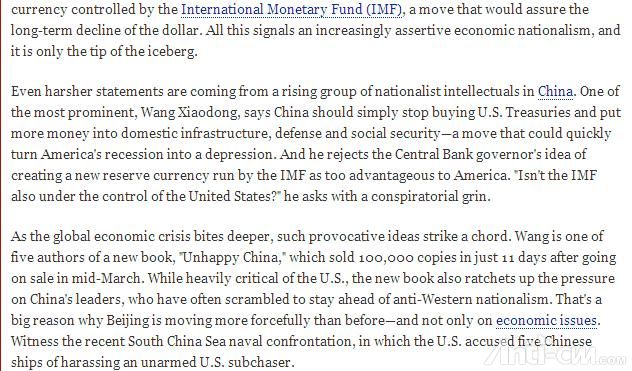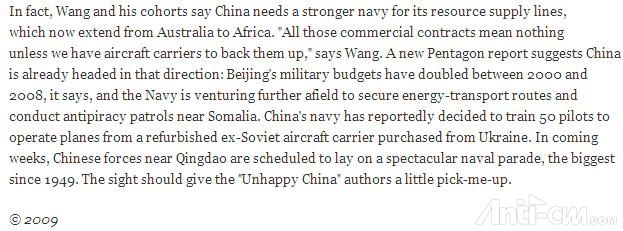|
|
本帖最后由 I'm_zhcn 于 2009-4-9 01:49 编辑
The Deep Roots Of China's New Economic Nationalism
http://www.newsweek.com/id/191516
Melinda Liu NEWSWEEK From the magazine issue dated Apr 6, 2009
The mood in china appears to be reaching a tipping point, as its normally bland leaders abandon cautious diplo-speak under the pressures of the global financial crisis. First, they blamed American capitalism for the crisis and Premier Wen Jiabao publicly pressed Washington to ensure the safety of some $2 trillion in U.S. debt held by Beijing. Then Central Bank governor Zhou Xiaochuan called for replacing the greenback with a new reserve currency controlled by the International Monetary Fund (IMF), a move that would assure the long-term decline of the dollar. All this signals an increasingly assertive economic nationalism, and it is only the tip of the iceberg.
Even harsher statements are coming from a rising group of nationalist intellectuals in China. One of the most prominent, Wang Xiaodong, says China should simply stop buying U.S. Treasuries and put more money into domestic infrastructure, defense and social security—a move that could quickly turn America's recession into a depression. And he rejects the Central Bank governor's idea of creating a new reserve currency run by the IMF as too advantageous to America. "Isn't the IMF also under the control of the United States?" he asks with a conspiratorial grin.
As the global economic crisis bites deeper, such provocative ideas strike a chord. Wang is one of five authors of a new book, "Unhappy China," which sold 100,000 copies in just 11 days after going on sale in mid-March. While heavily critical of the U.S., the new book also ratchets up the pressure on China's leaders, who have often scrambled to stay ahead of anti-Western nationalism. That's a big reason why Beijing is moving more forcefully than before—and not only on economic issues. Witness the recent South China Sea naval confrontation, in which the U.S. accused five Chinese ships of harassing an unarmed U.S. subchaser.
In fact, Wang and his cohorts say China needs a stronger navy for its resource supply lines, which now extend from Australia to Africa. "All those commercial contracts mean nothing unless we have aircraft carriers to back them up," says Wang. A new Pentagon report suggests China is already headed in that direction: Beijing's military budgets have doubled between 2000 and 2008, it says, and the Navy is venturing further afield to secure energy-transport routes and conduct antipiracy patrols near Somalia.
China's navy has reportedly decided to train 50 pilots to operate planes from a refurbished ex-Soviet aircraft carrier purchased from Ukraine. In coming weeks, Chinese forces near Qingdao are scheduled to lay on a spectacular naval parade, the biggest since 1949. The sight should give the "Unhappy China" authors a little pick-me-up.




|
Deep, Economic, National, Roots, The, Deep, Economic, National, Roots, The, Deep, Economic, National, Roots, The
评分
-
1
查看全部评分
-
|